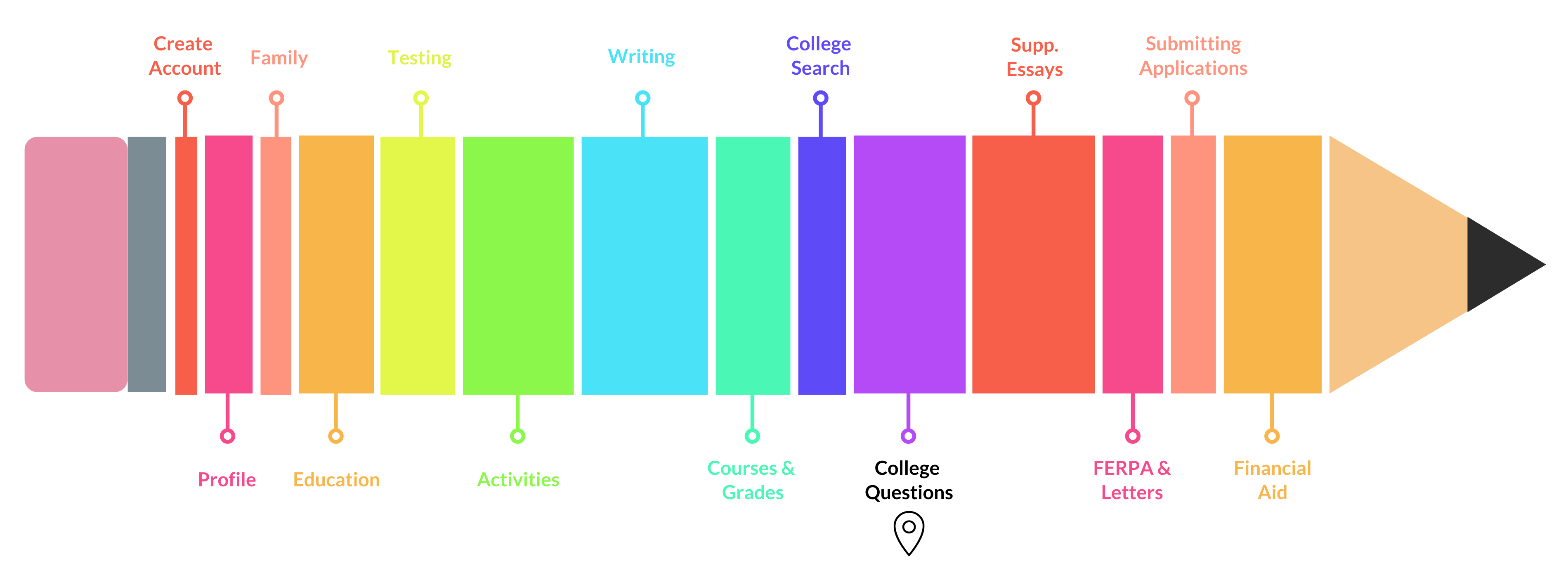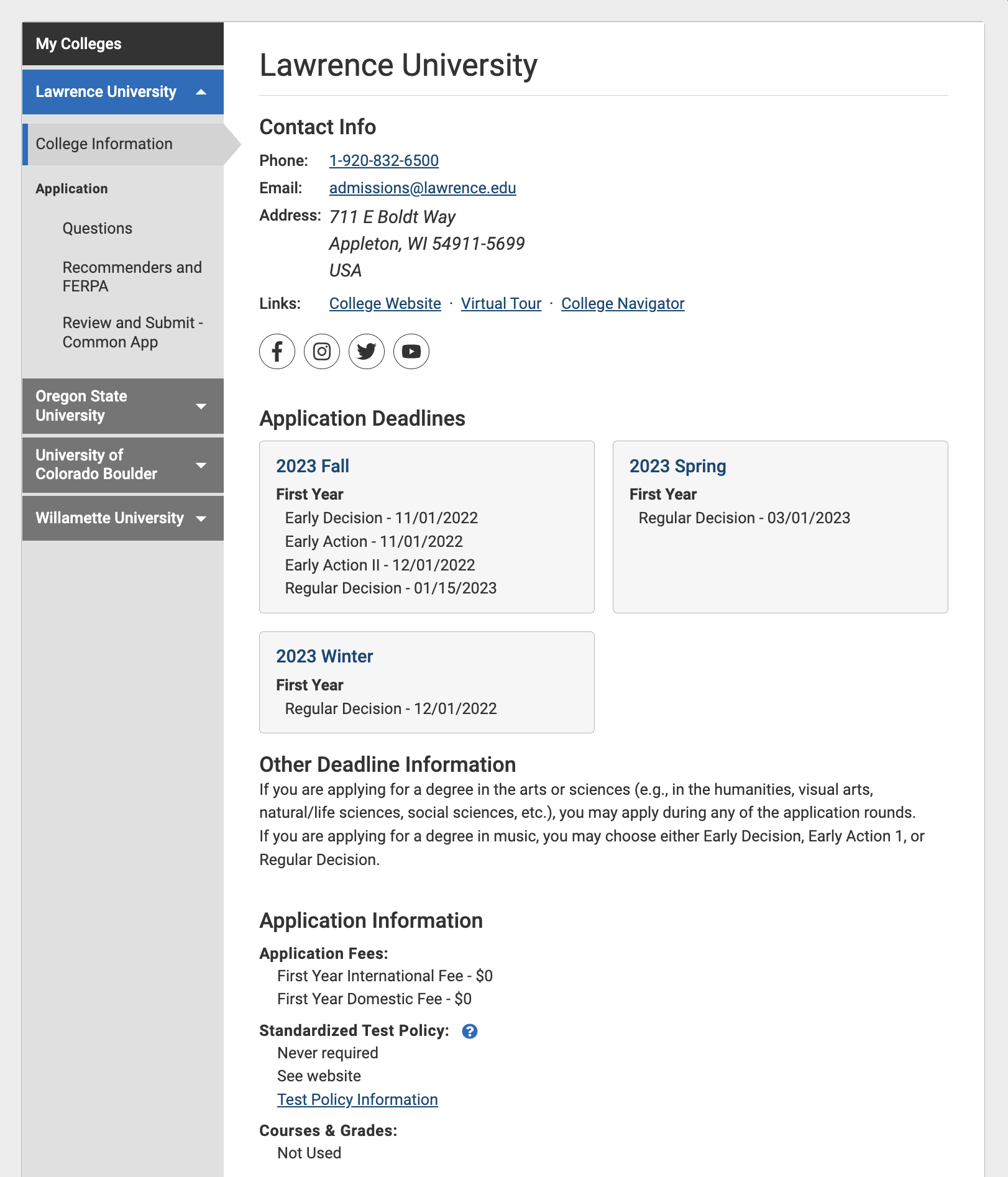Questions
 This process should take approximately 15 – 45 minutes for each college that you are applying to.
This process should take approximately 15 – 45 minutes for each college that you are applying to.
Items marked with a red asterisk * are required. Students are not required to complete items that do not have the red asterisk.
Introduction
All colleges that accept Common App require applicants to complete the questions found within the Common App tab. Each college also has additional questions and essays found in the My Colleges tab. Sometimes these additional questions can be fairly extensive. In this section, you will learn about and complete the My Colleges section of Common App for each college.
Questions you will be asked include:
- Information about your family, residency, and academic interests or intended college major
- Different decision plans: Early Action, Early Decision, Regular Decision, and more
- Applying to an honors college or honors program
- Whether you intend to apply test-optional (without submitting an ACT or SAT score)
- Questions about activities, including possibly the opportunity to upload a resume
Preview
This is an example of the My Colleges tab in Common App.

Before You Start
In order to complete this section, you will need the following information:
- Information about where your parents attended college and/or graduate school and dates of graduation, if applicable. It is ok if your parents did not attend college. Colleges just want to understand your background.
- Your grade point average (GPA), class rank, and your high school’s grading scale. Ask your school counselor or school administrator for this information if you do not have it.
Videos
In this video, we discuss the College Information section of the My Colleges tab on Common App. The purpose of this section is for you to understand where to find an overview of the specific application requirements for each college on your list. This video should take approximately 3 minutes.
In this video, we discuss some of the general questions you will find in the My Colleges tab. These questions include the following topics: the admission plan, submitting standardized test scores, honors colleges, whether you intend to apply for financial aid, applying for merit scholarships, intended major or area of academic interest. This section should take 5 – 15 minutes per college.
Some colleges will ask you to choose your preferred testing plan. This question is asking whether you want to submit an ACT or SAT score as part of your application. In this video, we discuss the most common standardized testing plans found at most colleges, including test-optional, test-flexible, and test-blind policies. We also discuss how to find a specific college’s testing policy. This video is 4 minutes in length.
In this video, we discuss the Academics section in the My Colleges tab. The purpose of this section is for you to share with colleges answers to questions about which specific campus you’d like to attend (if a college has more than one) and indicate academic interests and/or choose which major you are applying to. Questions will vary by college. This section should take approximately 5 – 15 minutes.
In this video, we discuss the Family/Residency sections of the My Colleges tab. The purpose of this section is for you to share with colleges information about your family’s educational history, where you live, and your academic background. This section should take approximately 5 minutes.
In this video, we highlight the types of questions you might find in the Activities section of the My Colleges tab of Common App. The purpose of this section is for you to share additional information about activities that you have done in high school and may want to do in college. Some colleges ask you to write a short essay about one of your activities. Some colleges will allow you to upload a resume. This section should take approximately 5 – 15 minutes (not including resume or short essay).
Some colleges have a special program called an honors college or an honors program. In this video, we discuss what an honors college or honors program is, what additional academic and scholarship opportunities they offer, and whether you should consider applying to one. If you apply to an honors college or program, you might need to write extra essays, so this section might take an hour or more to complete. If you do not apply to an honors program, this section should take 1 minute to complete.
Vocabulary
Admission Plan
A common question within the My Colleges section is which admission or decision plan you wish to apply under. There are several possible admission plans offered by colleges, but because each college chooses which plans to offer, you should check with each of your colleges to determine which ones they offer. Options might include Regular Decision, Early Action, Early Action II, Restricted Early Action, Early Decision, Early Decision II, or Rolling Admission.
Regular Decision (RD) is the traditional admission plan and the final date that applications can be submitted to many colleges or universities. Under this plan, you will receive your admission decision in the spring – usually around mid to late March or early April.
Early Action (EA or EA I) is an admission plan where you apply with an earlier deadline and receive your admission decision earlier. Early Action is non-binding, meaning that you can apply to other colleges and, if you are accepted, you are not committed to attend this university.
Early Action II (EA II) is an application plan with the same rules as Early Action but the submission date is later and the college’s admission decisions arrive after EA I, but usually before regular decision results.
Restricted Early Action (REA) or Single Choice Early Action is a very specific admissions plan offered by only a few universities. The rules of this type of plan are specific to each university that offers it, so it is important that you visit that college’s admissions webpage to read the decision plan’s limitations and descriptions. Generally speaking, this type of plan is a form of Early Action, but you are limited in how many other early applications you may submit. You should speak with your school counselor and your parents before selecting this option.
Early Decision (ED) is a binding agreement between you and a college in which you agree that you WILL attend that college should they offer you admission. You can only apply to one college ED. If you’re accepted, you must withdraw all other applications to other colleges. When applying Early Decision, you might still be able to apply to other colleges using the Early Action plan because Early Action is non-binding, but if you are accepted to the ED school, you would have to withdraw the EA applications to other colleges. If you have applied ED to a college, you can still apply to colleges Regular Decision but again, if you are admitted to the ED college, you would need to withdraw your RD applications. ED applications usually require you and your parents and your school counselor to sign an agreement that you will attend if you are accepted. You should speak with your school counselor and your parents before selecting your preferred admission plan.
Early Decision II (ED II) has the same rules as Early Decision, but the submission dates are later and the decisions arrive after ED I.
Rolling Admission – This application plan means that colleges evaluate applications as they receive them. They release admissions decisions regularly – sometimes daily – as opposed to sending them all out on one specific day. Often under a Rolling Admission plan, colleges will continue to accept applications later into the academic year than under other plans.
Standardized Testing Plan
A common question within the My Colleges section is one which asks you to choose your standardized testing plan. There are several possible testing plans offered by colleges. The most common testing plans are test-optional, test-flexible, and test-blind.
Test-Optional – Recently, a growing number of colleges and universities have allowed students to choose whether or not to report SAT or ACT scores in their applications. These institutions are called “test-optional” and for these schools, it is the student’s choice whether or not to take the SAT or ACT and whether or not to report scores that were received.
Test-Flexible – Some colleges allow students to report scores from alternative tests to the SAT/ACT, including Advanced Placement (AP) tests or International Baccalaureate (IB) tests.
Test-Blind – A small but increasing number of colleges and universities have adopted a “test-blind” admission policy, which means the college or university will not consider test scores in their application review (even if the score is reported).
Tips & Reminders
- When selecting an admission plan, be aware that an Early Decision application is binding. You are agreeing that you will attend that college if you are accepted. Do not apply Early Decision without first discussing this option with parents and your high school counselor.
- If you have questions about an admission decision plan, you can always call the admission office at that college to ask.
- Checking the box “yes” that you intend to apply for financial aid is not the same thing as applying for financial aid. For helpful advice regarding applying for financial aid, please see Financial Aid & Resources in the AXS Companion.
- Many colleges offer merit-based scholarships, which are scholarships based on talents, skills, and other attributes. Some merit-based scholarships require additional essays or applications, so check the college’s website carefully for more information.
- Some colleges require students to submit standardized test scores when they apply. The best source of information about a college’s policy is always the college itself. An additional source for information about testing policies can be found at FairTest.org.
- If a college does not require test scores, deciding whether or not to report test scores can be complicated and will vary by student as well as by college. Talk to your school counselor for their advice in making this decision.
- If you choose to apply test-optional, be certain that you have removed any test scores that you may have entered in the Testing section within the Common App tab of your application.
- If you choose to submit test scores, some colleges allow you to report your scores in Common App. Some colleges have an additional online form that you must complete. Some colleges require that you send official scores directly from the testing agency. Make sure you are following the correct policy for each college.
- When completing questions about your GPA or class rank, do not guess. If you do not know the answer, ask your school counselor or school administrator.
- Public University Honors is a website where you can learn more about honors colleges at public universities.
- If you choose to upload a resume to an application, you can find advice about how to create a resume in the WOW – How to Write a Resume.
Early Action (EA or EA I) is an admission plan where you apply with an earlier submission deadline and receive the college’s admission decision earlier. Early Action is non-binding, meaning that you can apply to other colleges and, if you are accepted to an EA university, you are not promising that you will attend this university.
Early Decision (ED) is a binding agreement between you and a college in which you agree that you WILL attend that college should they offer you admission. You can only apply to one college ED. If you’re accepted, you have to withdraw all of your other applications to other colleges. When applying Early Decision, you can still apply to other colleges using the Early Action plan because Early Action is non-binding, but if you are accepted to the ED school, you would have to withdraw the EA applications to other colleges. If you have applied ED to a college, you can still apply to colleges Regular Decision but again, if you are admitted to the ED college, you would need to withdraw your RD applications. ED applications usually require you, your parents, and your school counselor to sign an agreement that you will attend if you are accepted. You should speak with your school counselor and your parents before selecting this admission plan.
Regular Decision (RD) is the traditional admission plan and the final date that applications can be submitted to many colleges or universities. Under this plan, you will receive your admission decision in the spring – usually around mid to late March or early April.
Many colleges and universities offer students the ability to apply and/or be automatically considered for their “Honors College” or “Honors Program.” These are special academic programs for high-performing, motivated students who are looking for special learning opportunities. Often there are perks that come with admission into these programs including special housing, earlier registration for classes, access to faculty and special academic advisors, special research opportunities, and more. Students in honors colleges/programs may also have special requirements that they have to fulfill. Often there are minimum GPA requirements that students have to meet in order to be eligible for consideration for admission into the honors college/program. To learn more, you can read about the entrance requirements, the benefits of being part of the honors college or program, and the requirements you will have to meet in order to be part of the honors college on the college’s website. In addition, Public University Honors is a website where you can learn more about honors colleges at a number of public universities.
Early Action II (EAII) is an admission plan with the same rules as Early Action but the submission date is later and the college’s admission decisions arrive after EA I, but usually before regular decision results.
Restricted Early Action (REA) or Single Choice Early Action is a very specific admission plan offered by a few universities. The rules of this type of plan are specific to each university that offers it, so it is important that you visit that college’s admission webpage to read the decision plan’s limitations and descriptions. Generally speaking, this type of plan is a form of Early Action but you are limited in how many other early applications you may submit. You should speak with your school counselor and your parents before selecting this option.
Early Decision II (ED II) has the same rules as Early Decision but the submission dates are later and the decisions arrive after ED I.
This admission plan means that the college evaluates applications as they receive them. They release admissions decisions regularly – sometimes daily – as opposed to sending them all out on one specific day. Often under a Rolling Admission plan, colleges will continue to accept applications later into the academic year than under other plans.




